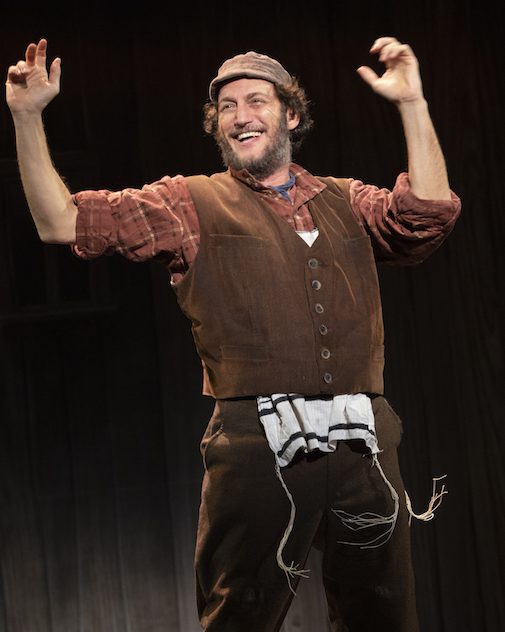I hadn’t seen Fiddler on the Roof since my senior year in high school in 1981. Growing up Jewish, Fiddler was more than just a musical. It represented our heritage and was ingrained in our DNA. That being said, it wasn’t a show I was dying to re-experience, mainly because, like my Bar Mitzvah, I felt that I’d been there, done that. The current touring production at the Segerstrom Center for the Arts, however, banished my reservations and reminded me what a solid show this is, grounded in a story that has the power to make you laugh and make you cry and (regrettably) is as relevant today (arguably moreso) as it was when it first appeared on Broadway in 1964. In the current climate with the rise of anti-Semitism, globally and nationally – including all-too-recent attacks at synagogues such as the Tree of Life and Poway — the story of a Jewish family trying to live their lives “in happiness and peace” while holding onto their traditions in a hostile world is especially timely and poignant.
Like many shows whose titular character is critical to the success of the show, Fiddler requires a lot of its lead Tevye. Just as there is no Funny Girl without the right Fanny, and there is no Sound of Music without the right Maria, there is no Fiddler without the right Tevye. Israeli actor Yehezkel Lazarov truly inhabits this role which he wears like a comfortable pair of broken-in shoes. Lazarov brings just the right mix of strength, humor, wisdom and wit to a role that was brilliantly crafted by book writer Joseph Stein. Lazarov’s body language, the twinkle in his eye, his asides to God, his ability to shift from flashes of anger to reasoned circumspection, show an actor in his element, meant to play this role. Case in point is the hilarious dream sequence where Tevye relates his dream (or rather, nightmare), a ruse to convince his wife Golde that their daughter’s match to the wealthy butcher must be broken at the behest of her dear departed grandmother’s warnings.

This production, under the auspices of NETworks Productions, revives the beauty and the power of this musical in a way that is faithful and yet fresh, mining the humor and the pathos to its full potential. Special mention must be paid to the director Sari Ketter as well as the set designer Michael Yeargan for this production’s clean, seamless staging, a feature which is easily overlooked, but when it’s done right, it showcases a classic in its best possible light.
Particular highlights that stood out for me included the beautiful tableau during the Sabbath prayer where we see other families in the background. Another effective tableau is used at the end of the show as the villagers are forced to pack up their belongings and leave en masse. It’s a heartbreakingly powerful image. I also liked how at one point, the sets representing other homes are suspended in the air, which visually sells the impression of a village so artistically. Overall, the cast was very strong. The three featured daughters (Tzeitel, Chava and Hodel) who must each find a way to fight to carve out their own happiness and take on centuries-old traditions and an at-times intimidating father were uniformly strong. The girls’ matches (Motel the tailor, Perchik and Fyedka) are likewise well-suited for their roles. Jeff Brooks turns in a solid performance as the Constable who tries to maintain a friendly relationship with Tevye out of respect, but ultimately shows his true colors when he executes his orders from on high.
The choreography was stylized and evocative. It wasn’t always as hard-hitting or powerful as I had hoped, but I’m guessing this was by design to convey a more fluid style in keeping with the cultural traditions. My personal sensibilities aside, the dancing felt authentic and conveyed a sense of the precarious state of their existence. The signature Bottle Dance at Tzeitel’s wedding was mesmerizing. One of the particularly moving dance sequences was Chava’s dance behind the scrim during Tevye’s song “Chavaleh” as he reflects on his daughter’s defiance.
While there is much to praise about this production, a couple of the performances missed their mark. The most significant of these shortcomings, for me, was the role of Golde because it’s such a pivotal role. Matie Uzal leaned heavily on presenting Golde’s stoicism which at times eclipsed the character’s warmth and humanity. This was most evident at her daughter’s wedding during one of the show’s signature songs “Sunrise Sunset.” While an argument can be made that Golde has built up a wall as a coping mechanism in what were challenging times, I would have liked to see more warmth. It’s a fine needle to thread, but I’ve seen it done. That’s not to say Ms. Uzal didn’t have flashes of brilliance such as the bedroom scene where she and Tevye are visited by the ghost of her grandmother Tzeitel or when she collapses, overcome with grief, when she realizes their daughter Chava has crossed a line which threatens to create an irreversible schism in the family. In that scene, Uzal seemed to let down her guard and show more of Golde’s humanity. The other quibble I had with this production was Carol Beaugard’s performance as Yente, the matchmaker, which felt a bit mannered and mechanical, like she was reciting scripted lines, indicating more than inhabiting the character.
These shortcomings aside, the show took a classic and made it shine, making for an exceptional experience in nearly every other way.
photo credits: Joan Marcus
